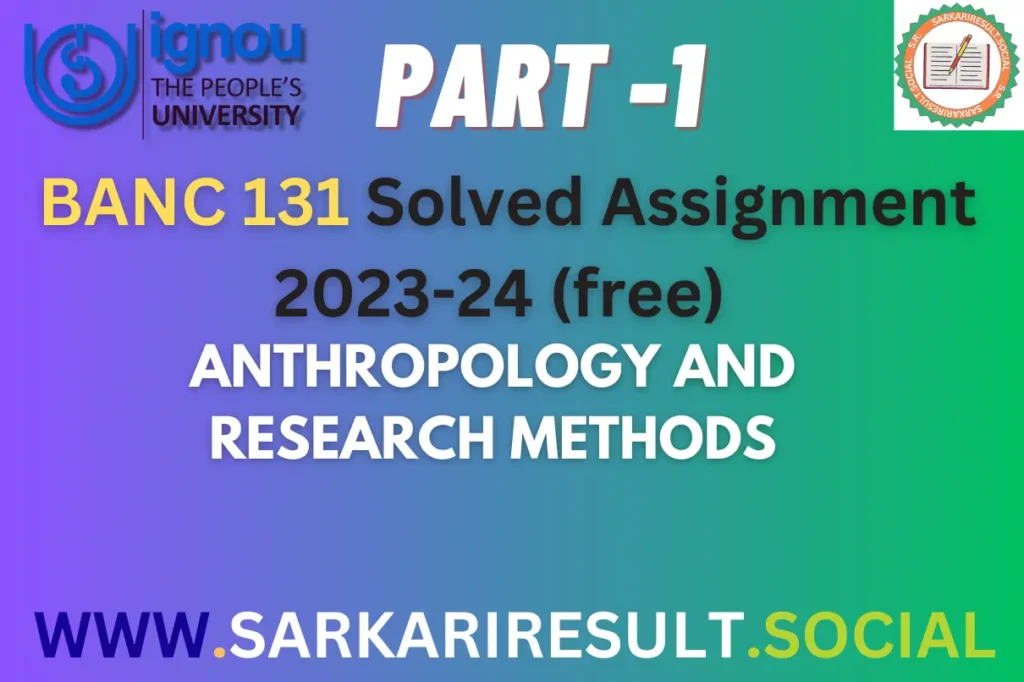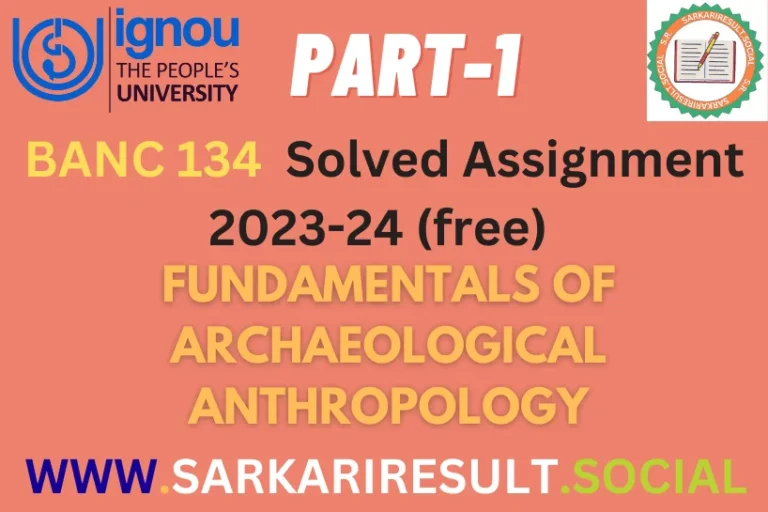BANC 131 IGNOU Solved Assignment 2023-24 (free) Part -1

BANC 131 IGNOU Solved Assignment 2023-24 (free) Part -1
Get ready to excel in BANC 131 IGNOU Solved Assignment 2023-24 (free) Part -1 with our comprehensive solved assignments for 2023-24! This booklet includes three TMAs, each carrying 30% weightage and 100 marks. Assignment A assesses your ability to construct systematic and coherent essay-type responses. Follow the provided instructions and stay within the word limits to maximize your success. Scoring well in these assignments is essential for eligibility in the term-end examination. Enhance your anthropology knowledge and academic performance today! Grab your BANC-131 IGNOU solved assignment 2023-24 now!
BSOG 176 Solved Part A (Questions and Answers)

Q.1 Define anthropology and discuss its scope briefly.
Ans. Anthropology is a multidisciplinary field of study that focuses on understanding human societies, cultures, and behaviors from a holistic perspective. It seeks to answer fundamental questions about what it means to be human by examining the diversity of human experiences, beliefs, practices, and social structures across different times and places. Anthropologists use a range of research methods and approaches to explore these aspects of humanity, making it a rich and multifaceted discipline.
The scope of anthropology is vast, encompassing several subfields that explore different facets of human existence. These subfields include cultural anthropology, physical anthropology, archaeology, and linguistic anthropology. Let’s briefly discuss each of these subfields:
1. Cultural Anthropology: This subfield focuses on the study of contemporary human societies and cultures. Cultural anthropologists immerse themselves in the lives of the people they study, often through participant observation, interviews, and ethnographic research. They seek to understand the beliefs, customs, social structures, and practices that shape different societies. Cultural anthropology helps us appreciate the diversity of human cultures and how they adapt to changing environments and global forces.
Check BGDG 172 IGNOU solved assignment 2023-24 (Free)
2. Physical Anthropology: Physical anthropology, also known as biological anthropology, examines the biological aspects of humanity. This includes the study of human evolution, genetics, primatology, and the biological variations among different human populations. Physical anthropologists investigate questions related to human origins, adaptation, and the development of our species.
3. Archaeology: Archaeology is concerned with the study of past human societies and their material remains. Archaeologists excavate and analyze artifacts, fossils, and structures to reconstruct the histories of ancient civilizations. They provide crucial insights into the development of technologies, trade networks, and the rise and fall of past societies. Archaeology also plays a significant role in preserving cultural heritage.
4. Linguistic Anthropology: Linguistic anthropology explores the role of language in human culture and society. Linguistic anthropologists study language’s structure, evolution, and cultural significance. They examine how language shapes communication, identity, and social relationships within different communities. This subfield also investigates language endangerment and preservation.
Anthropology’s scope extends beyond these subfields, as it often intersects with other disciplines such as history, sociology, psychology, and economics. Additionally, applied anthropology applies anthropological knowledge and methods to address real-world issues, including public health, development, and social justice.
Anthropologists use a variety of research methods, including participant observation, interviews, surveys, archival research, and laboratory analysis. They approach their work with cultural relativism, which means understanding and interpreting other cultures without judgment, and with an emphasis on empathy and respect for the people being studied.
Moreover, anthropology is not limited to academic research alone. Anthropologists often work in diverse settings, including universities, museums, government agencies, non-governmental organizations, and corporations. Their expertise is invaluable in fields such as cultural resource management, international development, healthcare, and policy analysis.
In summary, anthropology is a comprehensive field that explores the intricacies of human existence from a variety of angles. Its subfields, including cultural anthropology, physical anthropology, archaeology, and linguistic anthropology, collectively provide a holistic understanding of humanity’s past, present, and future. Through rigorous research and a commitment to cross-cultural understanding, anthropology contributes to our knowledge of what it means to be human and how we can navigate the complex challenges of our interconnected world.
Check BSOG 176 IGNOU solved assignment 2023-24 (Free)
Q.2 Discuss the history of fieldwork and criticism of Arm chair anthropology.
Ans. The history of fieldwork in anthropology is a tale of evolution, transformation, and criticism. Fieldwork is the hallmark of anthropological research, where scholars directly engage with and immerse themselves in the cultures and societies they study. However, before the advent of fieldwork, anthropologists practiced what is often criticized as “armchair anthropology,” where they relied primarily on secondhand accounts and texts to analyze and theorize about other cultures.
The origins of anthropology as a discipline can be traced back to the 19th century when it emerged within the context of colonialism, exploration, and the study of “exotic” peoples. Early anthropologists, such as Lewis Henry Morgan and Edward Burnett Tylor, relied heavily on armchair methods. They analyzed ethnographic materials, collected by missionaries, travelers, and colonial administrators, to formulate theories about the development of human societies and the evolution of culture. These theories were often Eurocentric and ethnocentric, reflecting the biases and limitations of armchair anthropology.
It was Franz Boas, a pioneering figure in the history of anthropology, who challenged the dominance of armchair methods. Boas advocated for the importance of fieldwork and firsthand data collection. He argued that to understand a culture, anthropologists needed to engage directly with the people they studied, learn their languages, and immerse themselves in their daily lives. Boas’s approach, known as cultural relativism, emphasized the importance of understanding other cultures on their terms, without imposing external judgments or preconceived notions.
Boas’s students, including Margaret Mead and Ruth Benedict, further advanced the practice of fieldwork. Their ethnographic studies, such as Mead’s work in Samoa and Benedict’s research in Japan, highlighted the cultural diversity and variability of human societies. These studies challenged the universalist and deterministic theories of earlier armchair anthropologists.
Despite the shift toward fieldwork, criticism of armchair anthropology persisted. One of the primary criticisms was that armchair anthropologists often relied on biased and unreliable sources, leading to inaccurate and misleading conclusions about other cultures. Their work was accused of perpetuating stereotypes and reinforcing colonial ideologies.
Another criticism of armchair anthropology was its detachment from the lived experiences of the people being studied. Armchair anthropologists were often seen as distant observers who lacked a deep understanding of the cultural nuances, social dynamics, and everyday realities of the societies they analyzed.
The legacy of armchair anthropology also raised ethical concerns. The colonial context in which it emerged meant that much of the information collected was often obtained through unequal power dynamics and sometimes even coercion. This raised questions about the ethics of using such data for academic purposes.
In response to these criticisms, contemporary anthropology places a strong emphasis on ethical fieldwork practices. Anthropologists are expected to obtain informed consent, protect the privacy and rights of research participants, and ensure that their work benefits the communities they study.
In conclusion, the history of fieldwork in anthropology reflects a significant shift away from armchair methods towards more immersive, ethical, and culturally sensitive research practices. While armchair anthropology had its limitations and faced valid criticisms, it played a role in laying the foundation for the development of a more rigorous and empathetic discipline. Today, anthropology recognizes the importance of engaging with the people and cultures it seeks to understand, and it continues to evolve in response to changing social, cultural, and ethical contexts.







